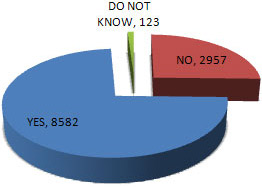You are here
- Regional security situation has provided India an opportunity to withdraw troops from Kashmir and redeploy it elsewhere: Azkar
- The Government should follow recent fatwa against suicide bombing: Khabrein
- Balochistan package not sufficient to coax the rebels: A I Rahman
- Concentrate on your eastern border, Nawae Waqt advises Pakistan
- India changes tone after listening harsh words: Ausaf
- Pakistan’s Pulse
Azkar, Editorial, December 7, 2009
Regional security situation has provided India an opportunity to withdraw troops from Kashmir and redeploy it elsewhere: Azkar
“Keeping in view the regional security situation, the so called biggest democracy in the world has withdrawn a large number of its troops from ‘Occupied Kashmir’,” writes Azkar Urdu daily in an editorial. The newspaper writes that during the past month, India withdrew three battalions of the CRPF (which altogether constitute 3150 personnel) and four more battalions are expected to be withdrawn soon.
The newspaper opines that “prima facie it seems a good gesture and a breakthrough towards resolving the Kashmir dispute. But this is an attractive tactic by India that is misleading.” Should Pakistan read too much in to this act and does India want to withdraw from Kashmir and resolve the issue according to UN resolutions? Will India give the Kashmiris’ the right of self determination, asks the daily? No, it is not going to do that. The situation in the region has provided India with an opportunity not to worry about Kashmir, opines the paper, adding that after 9/11 the international scene has changed and Pakistani forces are preoccupied on the Western front instead of the Eastern front. The situation manifest in Kashmir is now evident in FATA, NWFP and Northern Punjab.
The paper writes that after the 9/11 India has made two gains. Firstly, using cunning diplomacy it was successful in making the world believe that the liberation movement within India is terrorist activity. The American attack on Afghanistan proved to be a lottery for India. In the name of helping rebuild a war weary Afghanistan it has opened four consulates from where it executes terror attacks inside Pakistan, alleges the paper.
Second, the withdrawal of the CRPF battalions from Kashmir is part of its strategy to redeploy the force to suppress the Maoist movement in India.
(http://www.dailyazkaar.com.pk/new/detail.php?category=17288&category_id=27&page=)
Khabrein, Editorial, December 8, 2009
The Government should follow recent fatwa against suicide bombing: Khabrein
At least 24 clergies belonging to the Ahle-Hadis (Salafi School of thought) issued an edict terming the suicide bombers and attacker on Madarsa and Mosques as non-believers. This comes days after a fatwa by Doctor Tahirul Qadri, (founder of the Minhajul Quran) declaring suicide bombing Un-Islamic, says Khabrein Urdu daily in its editorial.
The government has failed to stop suicide attacks, but since the clerics have come to the forefront there message should reach to Taliban. The Imam of mosques should be directed to preach brotherhood and end sectarian divide, suggests the paper, adding that the government should propagate the message of the religious leaders.
The paper notes that clerics based in Rawalpindi has said that there still exist Medersas where terrorism flourishes and suggest the government to immediately abolish such teaching centres.
(http://www.khabrain.com/idaria_detail.aspx?id=1)
Khabrein, Column, December 8, 2009
Balochistan package not sufficient to coax the rebels: A I Rahman
Commenting on the recently announced Balochistan package, Columnist A I Rahman opines in Khabrein Urdu daily that: “it is incredible to believe that the government will be able to rein in Balochistan’s deprived and rebellious people by merely offering them good wishes and proposals.”
He says that the author of the package, Ghulam Raza Rabbani, has included various proposals such as provincial autonomy, releasing all political prisoners; locate disappeared people, construction of a new cantonment, investigation into the killing of Nawab Akbar Bugti and other Baloch leaders, and reservation in jobs for the Baloch. But the columnist opines that “unfortunately this package by the government makes it clear that Islamabad has failed to understand the sensitivity of the Balochistan crisis. They are not aware of the fact that such proposals during the last six decades have made no impact on the Balochistan movement and they can not be convinced as they have already decided on an independent future. The government must have some concrete proposals in hand to bring the rebel youth to the negotiating table. Only this will enable as engagement with the Baloch leaders some of whom prefer to stay abroad.”
The author suggests the government create an atmosphere in which all parties, irrespective of whether they are rebels and those who believe in parliamentary politics, agree for talks.
He argues that policy makers should not forget that Balochistan is divided in to two groups, one group who see an opportunity to live with Pakistan and another who believe in achieving independence, no package can coax the latter. Therefore the only option for the centre is to pursue the former and convince the Baloch masses that their problems in Balochistan are a relic of the past.
The columnist concludes by noting that the government can implement some of its big proposals to stop it becoming a failure.
www.khabrain.com/idaria_detail.aspx?id=5 (accessed on December 8, 2009)
Nawa-e-Waqt, Editorial, December 8, 2009
Concentrate on your eastern border, Nawae Waqt advises Pakistan
“Interior Minister Rehman Malik has said that India is involved in growing terror attacks in Pakistan whereas Foreign Minister Shah Mehmood Qureishi says there is no sufficient evidence of India’s intervention in Pakistan,” writes Nawa-e-Waqt Urdu daily in its editorial.
The daily says that “the Interior Minister is he most responsible person as regards the country’s internal affairs. If he presents credible evidence of India’s involvement and the Foreign Minister does not think it sufficient, it is unfortunate and shows a lack of coordination between the ministries and ineptness of their officials.”
The daily opines that since there is sufficient evidence of India’s involvement in terrorism inside Pakistan, there is no reason for the Indian High commissioner staying in Pakistan. India is trying to destabilize Pakistan and it is prepared for war, alleges the daily. It urges Pakistan to take note and should be concerned about its Eastern border instead of the Western border. The daily states that India has deployed a squadron of its fighter planes.
(http://www.nawaiwaqt.com.pk/pakistan-news-newspaper-daily-urdu-online/Opinions/Editorials/8-Dec-2009/6763)
Ausaf, Editorial, December 8, 2009
India changes tone after listening harsh words: Ausaf
India has finally admitted that the Pakistani military is capable of safeguarding its nuclear weapons, says Ausaf Urdu daily in its editorial quoting Shashi Tharoor, India’s Minister of State for External Affairs. The daily says that this is the same India which had been preaching that Pakistan’s atomic assets are insecure, is on the verge of collapse and its military has fundamentalist elements. The daily observes that this change in India’s tone has taken place after Pakistan vigorously raised the issue of India’s involvement in Balochistan and Waziristan.
The daily suggests “with this policy shift Pakistani rulers should take the message that its enemy understands only harsh language and in the future it should speak the same language”. The daily opines that whenever Pakistan goes soft and speaks in a defensive tone, India tries to dominate Pakistan.
http://www.dailyausaf.com/news/id/21251/
Pakistan’s Pulse
A majority of Pakistanis’ believe that India and the US are involved in recent terror attacks in Pakistani cities, says an online opinion poll by Asas Urdu daily. To a question “whether India and the US are involved in terrorist activities in Pakistan, a majority of 8651 respondents responded “Yes”, while 2538 respondents replied in “No”.
Q Do you believe India and the US involved in the terrorists’ activities in Pakistan? ( Poll Conducted on December 8, 2009)
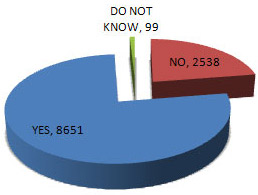
A similar poll suggested that the government needs to change its strategy to tackle terrorism. When the Asas daily asked a question whether government should change its policy to stop terrorism, a majority of 7958 respondents agreed that the government should change its strategy while 3265 respondents replied “No”
Q. Should the government change its policy to stop terrorism? ( Poll Conducted on December 9, 2009)
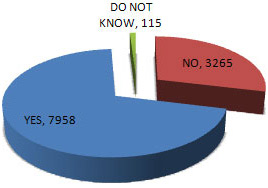
Yet another opinion poll conducted against the backdrop of the Fatwa issued by clerics in Rawalpindi declaring suicide bombing un-Islamic, found that the fatwa will not deter the terrorists. To a question “whether terrorists will desist from terrorists attack after the fatwa,” a whopping majority of 9278 respondents believe that they will not stop their activities while 2547 respondents were still optimistic and responded “Yes.”
Q Do you think the terrorists will desist from attacks after the fatwa against them? ( Poll Conducted on December 6, 2009)
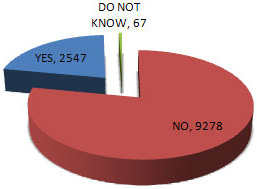
http://www.dailyasas.com.pk/poll_answer.html
A majority of Pakistanis’ believe that the present government is inept in stopping recent terror attacks in Pakistani cities, says an online opinion poll by Asas Urdu daily. To a question “Will the government be able to stop terrorist attacks, a majority of 6985 respondents responded in No, while 3241 respondents still had faith in the present government’s ability and replied in “Yes” .
Q Will the government be able to stop terrorist attacks? ( Poll Conducted on December 10, 2009)
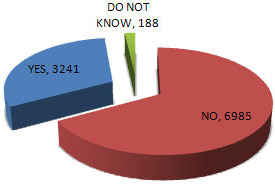
A majority of Pakistanis’ also believe that President Zardari should resign because of his ineptness in stopping recent terror attacks in Pakistani cities, reveals yet another online opinion poll by Asas Urdu daily. To a question “Should Zardari resign in the present circumstances”, a majority of 8582 respondents responded “Yes”, while 2957 respondents replied “No”.
Q. Should Zardari resign in the present circumstances? (Poll Conducted on December 11, 2009)
